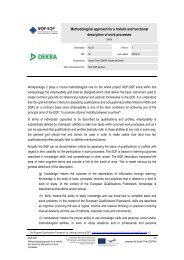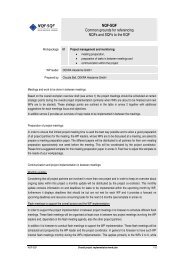Overview of National Qualification frameworks - Project-Nqf-Sqf
Overview of National Qualification frameworks - Project-Nqf-Sqf
Overview of National Qualification frameworks - Project-Nqf-Sqf
You also want an ePaper? Increase the reach of your titles
YUMPU automatically turns print PDFs into web optimized ePapers that Google loves.
Template for an overview <strong>of</strong> NQFs in RomaniaWork package 3:Referenceability <strong>of</strong> <strong>National</strong> <strong>Qualification</strong> Frameworks1 Structure and levels <strong>of</strong> NQFFor countries that already have an NQF or plan to introduce an NQF:__ How many levels does/will the NQF have?Romania is among the EU member states which do not have yet a <strong>National</strong> <strong>Qualification</strong>sFramework, but are currently working on the development and implementation <strong>of</strong> suchframework. An eight-level reference structure reflecting EQF will be proposed.However, a <strong>National</strong> <strong>Qualification</strong>s Framework for Higher Education (NQFHE) is developedand defined within a strategic project coordinated by <strong>National</strong> Agency for <strong>Qualification</strong>s inHigher Education and Partnership with the Economic and Social Environment – ACPART 1called “Development <strong>of</strong> an Operational System <strong>of</strong> <strong>Qualification</strong>s in Higher Education inRomania – DOCIS” which started in November 2008 and will finish in October 2011.The structure <strong>of</strong> the <strong>National</strong> <strong>Qualification</strong>s Framework for Higher Education is based on 3levels <strong>of</strong> qualifications obtained upon completion <strong>of</strong> university studies:- Bachelor university studies, corresponding to level 6 <strong>of</strong> the European <strong>Qualification</strong>sFramework (EQF);- Master’s university studies, corresponding to EQF level 7;- Doctoral university studies, corresponding to EQF level 8.__ What kind <strong>of</strong> descriptors are/will be used (learning outcomes, dimensions)?Level descriptors are being developed, defined in terms <strong>of</strong> learning-outcomes that includecomponents <strong>of</strong> knowledge, skills and competence.Level descriptors for HE has been already developed in line with QF-EHEA and EQFand approved. Each qualification is defined by means <strong>of</strong> learning outcomes expressed in terms<strong>of</strong> pr<strong>of</strong>essional and transversal competences developed during the respective cycle <strong>of</strong>university studies. NQFHE capitalize on the descriptors <strong>of</strong> the overarching framework forqualifications in the European Higher Education Area for the Bachelor, Master’s and Doctoratelevels. They are generic descriptors based on which both pr<strong>of</strong>essional competences(descriptors from 1 to 5) and transversal competences (descriptors from 6 to 8) are analysedand described.The generic descriptors are explained through level descriptors for each learningoutcome, for each type <strong>of</strong> competence and for each qualification level.The level descriptors indicate expected activities, outcomes and performances for eachqualification level. They allow for the description <strong>of</strong> qualifications and, at the same time,formulate the necessary landmarks for the assessment <strong>of</strong> the competences level.1 According to the Emergency Ordinance <strong>of</strong> the Government no. 74/ 2010 and the GD no. 885/ 2010, the <strong>National</strong> Agencyfor <strong>Qualification</strong>s in Higher Education and Partnership with Economic and Social Environment - ACPART is abolishedand by the merging withTheTechnical Secretariat <strong>of</strong> the <strong>National</strong> Council for <strong>Qualification</strong>s and Adult Training becamethe Executive Unit <strong>of</strong> the <strong>National</strong> Council for <strong>Qualification</strong>s and Adult Training.




